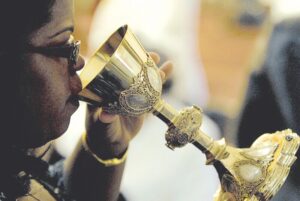
To the Clergy, Religious and Laity of the Archdiocese of New Orleans
Dear Sisters and Brothers in Christ:
“On Sunday, stop by for a visit before the game. Sincerely, God.”
I remember seeing this billboard several years ago. It captures in a humorous way the importance of Sunday Mass. As I reflect with you on the Mass, we are mindful that on November 27, 2011, the Catholic Church in the English-speaking world embraced some changes in the Mass and began using the new Roman Missal.
As we have experienced, there are changes in many of the prayers and in the Profession of Faith. Blessed John Paul II called for the changes several years ago because they provide a more accurate translation from the original Latin texts. While some of the prayers have changed, the actions of the Mass and the ritual remain the same.
A Year of Renewal
We will observe from November 2011 through November 2012 in the Archdiocese of New Orleans “A Year of Renewal: Offering a Worthy Sacrifice of Praise.” There will be many archdiocesan and parish programs that will provide opportunities for us to nurture a deeper understanding of and appreciation for the Mass.
Why Sunday Mass?
When God gave Moses the Ten Commandments, the Third Commandment was: “Keep holy the Lord’s Day.” In this commandment, God calls us to make holy the Lord’s Day by worshipping God and by building up our own families and communities of faith through our actions. This is specific in the laws of the Church: The First Precept, “You shall attend Mass on Sundays and on Holy Days of Obligation and rest from servile labor…” Both the Ten Commandments and the Commandments of the Church remind us that as Catholics we should observe this holy day by celebrating Mass with the Catholic Christian community. In our time, this command of Jesus and of his Church has not been taken to heart and is sometimes not practiced. Surveys in the United States show that only about 30 percent of the members of most Christian denominations go to church on Sunday.
In addition to worshipping at Mass, the Church also encourages us on Sunday to abstain from unnecessary servile work. The reason for this encouragement is that Sunday should be primarily a day to worship God and spend quality time with family. In this spirit, we should try to limit activities planned by schools and organizations which take parishioners away from their parish community and their family.
Hopefully, this “Year of Renewal” for us in the Archdiocese of New Orleans will be an opportunity to take more seriously this command of God to worship every Sunday and to come to a deeper appreciation of the Mass. At the baptism of their child, parents promise to raise their children in love and to bring them up according to the law of Christ and his church. Therefore, it is the responsibility of parents not only to go to Mass, but also to provide an example for their children on Sunday.

‘Do this in memory of me’
Why is the Eucharist so important? The Gospel tells us that Jesus took bread, blessed it, broke it, gave it to his disciples and said, “This is my body which will be given up for you.” He took a cup of wine, blessed it and gave it to his disciples and said, “Take this all of you and drink from it, this is the chalice of my blood…” Immediately after Jesus gave his Body and Blood to the apostles he then said: “Do this in memory of me.” In the same way he commanded his apostles to celebrate the Eucharist, he commands us to continue to celebrate this meal in his memory.
“The command of Jesus to repeat his actions and words ‘until he comes’ does not only ask us to remember Jesus and what he did, it is directed at the liturgical celebration, by the Apostles and their successors, of the memorial of Christ, of his life, of his death, and of his resurrection, and of his intercession in the presence of the Father” (The Catechism of the Catholic Church #1341). The Mass is for us a participation in Jesus offering himself to the Father as a sacrifice for us and remains for us a family meal where we gather to be fed by the Body and Blood of Christ. It is a most sacred moment when we unite ourselves to Christ and offer ourselves, all that we are, and all those whom we hold in our hearts, to the Father.
In our own day and time, hopefully we will come to a deeper appreciation of this great gift. It is easy with our busy Sunday schedules to nudge God out of our lives. This may call to mind the question that Jesus asked the disciples in the Agony of the Garden the night before he died: “Could you not spend an hour with me?” (Matthew 26:40)
The Church calls us to celebrate the Mass not simply because we should get something out of it, but because it is our opportunity to be humble and, in a spirit of thanksgiving, to give praise and thanks to God for all that he has given to us. Likewise, we ask for God to strengthen us through the nourishment we receive in the Word of Scripture and in the Eucharist for our journey in the coming week.
Prepare for Mass
Because the Eucharist is so important, we must prepare in order to celebrate worthily. The Church still asks us to fast for an hour before Communion from all food and drink except water. This is to remind us that as we hunger for love, people and many things on this earth, our greatest hunger needs to be for God and for his presence in our lives.
In preparation for Mass, it is always helpful to arrive early (to avoid the rush) and pray quietly in order to be truly open to God. For this reason, the church building should be quiet in order for people to prepare for the liturgical celebration.
Two parts of the Mass
There are two parts of the Mass that are interrelated. The first part of the Mass is the Liturgy of the Word, whereby God speaks to us through the Scriptures. It is not the word of a human being, but the Word of God calling us to accept his love, to be faithful to him and to follow Jesus. The Word of God is meant not just to be heard with our ears, but it also is intended to penetrate our hearts and become flesh in us, thus affecting our words, our actions and our attitudes. We should listen attentively to God’s Word as it is proclaimed. For this reason there should be no movement in the church while the Scriptures are proclaimed but complete focus on God speaking to us as a community of faith. Having been nourished by God’s Word in the Scriptures, we then turn to the Altar of Sacrifice and our family table. Through the Eucharistic Prayer, the great prayer of thanksgiving, simple gifts of bread and wine, signs of our lives, become the Body and Blood of Christ. As Christ offers himself to the Father, we unite with him in that offering. The gifts of bread and wine become the Body and Blood of Christ.
Real Presence of Christ
There is sometimes a misunderstanding of the Catholic belief of the real presence of Christ in the Eucharist. The bread and wine, fruit of the field and the work of human hands, become the Body and Blood, Soul and Divinity of Christ. They do not just point to Christ or commemorate the Last Supper. Through the calling down of the Holy Spirit in the Eucharistic Prayer and the words of consecration, the simple gifts of bread and wine become the Lord Jesus Christ and give us a share in his life, death and resurrection. How blessed and privileged we are to be able to not only speak to our God, but also to receive from him the gift of his own Son in the sacrifice of the Mass.
In both the Body of Christ, as well as in the Blood of Christ, we receive the fullness of Jesus Christ. The Church does encourage, when possible, that Communion be given both as the Eucharistic bread and the Eucharistic cup.
Active participation at Mass
The Constitution on the Sacred Liturgy from Vatican II reminds us that the church earnestly desires all the faithful be led to that full, conscious and active participation in liturgical celebrations (#14). We do not “go to Mass” in a passive way but are called to pray, listen and sing with the faith community. Though many Catholic devotions are valuable and a part of our long tradition, they should not be prayed during Mass. The Mass is not my private prayer, but God’s community gathered as a family praying in one voice with one heart.
Vatican II also states: “The Eucharist is the source and summit of the Christian life” (Lumen Gentium #11). The other sacraments and all ministries of the church are connected to the Eucharist and are oriented toward it.
As we celebrate this Year of Renewal, I implore all of us to spend time in prayer and in our religious education efforts to read about the importance of the Mass and the great gift that is given to us in the Eucharist. Perhaps during this year, we can also make a more firm resolution to celebrate Mass at least each Sunday even when our schedules are crowded. When we are tired and many other responsibilities weigh heavily upon us, it is in these moments that we should be at Mass and bring to God all that we are, both our joys and all that burdens us, in order to be fed by the Lord Jesus Christ.
Thanks
We are mindful that there are many people who give of themselves generously in preparing for our Sunday Eucharist. I extend gratitude to my brother priests for their careful celebration of the Mass and for their preparation of the homily in striving to feed God’s people by breaking open the Word. Likewise, I thank our deacons who assist the priest at Mass, proclaim the Gospel and also preach God’s Word. We are very blessed and fortunate to have young women and men who serve at Mass. I am always inspired by our young church and their desire to be close to the Lord’s Table and the Eucharist. I am especially inspired when I see young adults in high school and college still giving of themselves as men and women of faith and serving at the altar. To the parish choirs throughout the archdiocese, we thank you for leading us in song and for giving us the opportunity to praise God with great joy and reverence. Thanks to the readers who carefully prepare the Scriptures and proclaim them to us. The Extraordinary Ministers of Holy Communion, through prayer and their own devotion to the Eucharist, have the privilege to give Communion to the community of faith as they come forward to be fed with the Body and Blood of Christ and to bring Communion to those ill and homebound. The ministers of hospitality (ushers) show that we are a welcoming community. Aside from the above-mentioned ministers, there are many people who work behind the scenes – the sacristans, altar society, liturgy directors and so many others – who make our celebration more pleasing to God. Please accept my sincere gratitude for all you do in order that the community can offer a worthy sacrifice of praise.
Eucharistic Adoration
This special year is an opportunity for us to be mindful of the presence of Christ in the tabernacle and grateful to those many parishes who offer eucharistic adoration. There are 13 parish communities in our archdiocese who are able to offer perpetual adoration and six others who have daily adoration for several hours. In those quiet moments before Christ in the Eucharist, we come to focus on who we are and allow our hearts to be touched by Jesus Christ who says: “Come to me all you who are weary and find life burdensome and I will give you rest” (Matthew 11: 28).
Go and Announce the Gospel of the Lord
In conclusion, let us remember that what we celebrate is called the “Mass.” The Catechism of the Catholic Church states, we call it “Holy Mass (Missa), because the liturgy in which the mystery of salvation is accomplished, concludes with the sending forth (Missio) of the faithful so that they may fulfill God’s will in their daily lives” (The Catechism of the Catholic Church #1332). From the Mass, we never simply depart, but we are sent. St. Augustine reminds us that we must become what we have received in the Eucharist. In the Mass we receive the Word of God and the Body of Christ. We must become his word and his presence in our world today. We certainly are called to do this with our families, neighbors, parish communities, but also we are sent to the poor, the forgotten, the sick, those with disabilities, those who are discouraged, depressed and have lost a sense of God’s love. To them, we must become that word of hope and the presence of Christ who calls them forth in love. In the new Roman Missal, the priest or deacon says: “Go and announce the Gospel of the Lord” or “Go in peace, glorifying God by your life.”
Thank you for joining me in observing “A Year of Renewal: Offering a Worthy Sacrifice of Praise.” May it be a blessed time for us as we fulfill the command of Jesus, “Do this in memory of me.”
Wishing you God’s blessings, and with the promise of daily prayers for our local church, I am
Sincerely in Christ,
Most Reverend
Gregory M. Aymond
Archbishop of New Orleans






